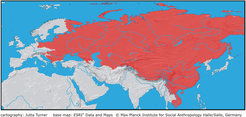Historical Anthropology in Eurasia

In many traditions of anthropology this title would be puzzling: how could there possibly be an anthropology that was not historical? The answer is that the dominance of the ethnographic method over the last century, especially in the Anglophone traditions, has been accompanied by an emphasis, if not exclusively on the synchronic, then at any rate on relatively shallow temporalities, seldom extending back beyond the reach of the memory of elderly informants. This ‘presentist’ bias has been productive in many fields, including in recent years in the study of postsocialist transformations. Yet the potential of longue durée approaches remains undiminished, not least from the point of view of understanding contemporary diversity in the wake of ‘high socialism’. In 2009, with the appointment of Dittmar Schorkowitz to a W2 position, the Department established a new Focus Group to develop such approaches.
Of course we are not the first to explore the interface between anthropology and history. Early efforts to integrate historical methods date back to the colonial era and the intellectual debates can be traced through to the present in currents such as postcolonial studies and subaltern studies. A great deal of this work has addressed the colonial empires of North Atlantic states in recent centuries. Significant work has also been undertaken in many parts of Europe, the Mediterranean and the Middle East. However, for most of the twentieth century it was difficult for foreign anthropologists to conduct either synchronic or diachronic studies in the Russian/Soviet and Chinese multinational empires. Meanwhile, cooperation with historians specializing in earlier periods and with archaeologists and Orientalists, let alone with scholars committed to some form of evolutionist theory, has remained very limited.
Against this background, this Focus Group will take advantage of greatly improved research access in the wake of the demise of ‘Marxist-Leninist-Maoist’ socialism in Eurasia to elaborate new research agendas for historically minded anthropologists in this part of the world. We shall explore the relevance of theories and methods developed for other places and other time frames in order to open up new avenues for comparison, and to initiate or renew cooperation with adjacent disciplines. We treat Eurasia as a single continent; this unity is given not simply by the recent history of socialism (varieties of which have also had a massive impact in regions such as western Europe and India) but by the evolution of complex societies across the landmass since the Bronze Age. However, we define the boundaries flexibly; regions such as North Africa or Indonesia will certainly be included whenever warranted by particular research questions. It is not intended to reify Eurasia in the way that so much effort has been invested over the years in reifying Europe.

Eurasia in the Heyday of Marxist-Leninist-Maoist Socialism
1. Ethnic Minorities and the State in Eurasia
This project was launched in 2009 and concluded in 2016. For a final report on all activities, including researchers' publications, see 'Ethnic Minorities and the State in Eurasia'.
2. Patriarchy and Familism in Time and Space
This project of Dr. Mikołaj Szołtysek was undertaken between 2013 and 2017. For a final report, see 'Patriarchy and Familism in Time and Space'.

